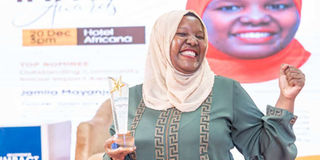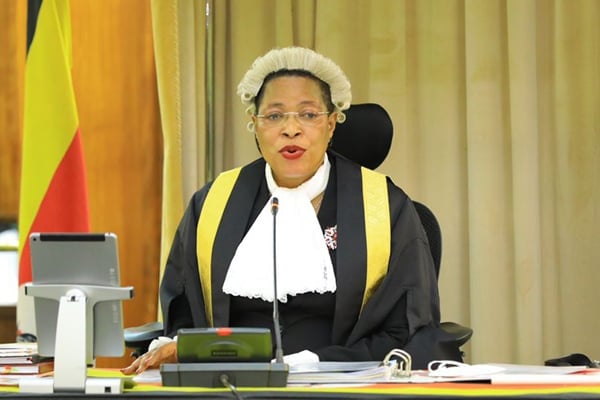
Marines prepare for national anthems of the US and Uganda at America’s 248th Independence celebrations at the US embassy in Nsambya, a Kampala suburb, on Wednesday. PHOTO | ELIZABETH KAMURUNGI
The United States Mission in Uganda on Wednesday excluded Ugandan ministers invited for the country’s 248th Independence celebrations, from speaking at the well-attended function.
Instead, State Minister for International Affairs Henry Okello Oryem- and other top government officials who were in attendance, looked on at the dais backgrounded against the animated US flag, also called the Star-Spangled Banner, as 36-year-old Jamila Mayanja spoke on behalf of the “Ugandan people”.
The Chief Executive Officer of the Smart Girls Foundation Uganda, a social enterprise that she founded in 2015, is an alumna of the US government-funded Mandela Washington Fellowship and last year emerged the Leadership Impact Award winner of the US exchange programmes.
Ms Mayanja, who describes herself on Linkedin as “passionate about girls and women empowerment, impact entrepreneurship and my religion”, spoke immediately before US Ambassador William Popp, the official host, and even proposed a toast to Uganda-US relations in a way previously reserved for Uganda government officials at such a function.
“By investing in the potential of our young women, we are not only promoting gender equality, but also driving economic growth and community development. Empowered women like me, yeah, lead to empowered communities and the ripple effect of these efforts is felt across the whole nation,” she said.
She added: “As we celebrate the US Independence…, let us also celebrate the spirit of partnership and the shared commitment to a brighter future for our youth. Together, Uganda and the US can continue to build a world where every young person, regardless of their background, has the opportunity to thrive and contribute to their communities. Together we are shaping a future of hope, equality and prosperity.”
Then Ms Mayanja dropped the clincher: a toast proposal to the warm Uganda-US friendship. The ministers, standing in the front row alongside Ambassador Popp complied, raising their glasses of drinks with a grin, but with no courtesy opportunity to, on behalf of Uganda government, congratulate America on its 248th Independence anniversary and proclaim a renewal of the cordial bilateral relations.
The Foreign Affairs Ministry and the US embassy yesterday separately said there was no need to read much into the exclusion of the ministers as speakers at the event, something retired Ambassador Harold Acemah last evening described as “likely intentional and a snub”.
“This is an indication that the relations between Uganda and America are not as cordial as they used to be…there are a lot of undercurrents since the anti-gay law was passed and signed by President Museveni,” he said.
Uganda’s Parliament enacted the Anti-Homosexuality Act (AHA) and President Museveni signed it into law in May 2023 amid protestations from western capitals, including Washington DC where President Joe Biden condemned it as a “tragic violation of universal human rights”.
His government followed by taking Uganda off the list of beneficiaries of the African Growth and Opportunity Act (AGOA), a preferential tariff and quota-free trade legislation for select sub-Saharan Africa countries. Washington, however, retained the nearly $1b (Shs3.7 trillion) annual support to Uganda, much of which goes through outside-the-government structures to health, agriculture, security, democracy, good governance and human rights promotion.
Ambassador Acemah, who worked at Uganda’s Permanent Mission in New York and retired when the deputy head of mission at Uganda’s European Union embassy is Brussels, said what transpired at the Independence event in Nsambya signals that Uganda is no longer a “darling” of the US as in the past.

Ms Jamila Mayanja, a 2015 Mandela Washington Fellowship (MWF) alumna and the winner of the 2023 Leadership Impact Award, spoke at the fete on behalf of Ugandan people. Photo | Mandela Washington fellowship website
“It’s in our own national interest to repair those relations … because Uganda needs the US more than the US needs Uganda,” he said, adding, in direct appeal to Ugandan officials, “If you have got your own frustrations with the US government or its actions, you express them quietly through diplomatic channels, and not reckless public statements.”
Minister Okello-Oryem in an interview yesterday sought to allay fears that the Kampala-Washington diplomatic train is hurtling off track.
“Is it a big deal?” he said of his exclusion from taking the podium. “There is no iota, even a drop of misunderstanding, no drop of grudge on our side, no single drop of negative feeling; that is the feeling of the government of Uganda. To the contrary, we are totally satisfied with the relationship.”
The Minister added: “Ask the Americans. It is their programme. It is their national day, their party; so, how they conduct their party we don’t complain.”
The premises of the US diplomatic representation, both the embassy and residence of the ambassador, are under the Vienna Convention considered sovereign and outside the control of the host government, in this case Uganda, represented at the Wednesday fete by ministers Okello-Oryem and Ms Babalanda whose presence in the crowd Ambassador Popp recognised in his speech.
In response to our inquiries why no member of the Executive branch of Uganda government was given the microphone, the US Mission in Kampala attributed it to a “shift in programming”.
“We were honoured to have many representatives of the Ugandan government and other sectors of society [to] celebrate with us. In the spirit of the United States government’s nearly $1 billion annual investment in the people of Uganda, we were proud to invite Jamila Mayanja, an alumna of the Mandela Washington Fellowship and a young entrepreneur empowering young women and girls, to share what she is doing to secure a promising future for the next generation of Ugandans,” the embassy noted in a statement.
It is a similar chord that minister Okello-Oryem struck when he spoke to us on Wednesday night, just before leaving the celebrations where fireworks blasted from the rooftop of the expanded US embassy building to cheers and yodeling from a milling crowd comprising government officials, academics, entrepreneurs, media personalities, alumni of educational and cultural exchange programmes funded by the US government and civil society actors.
“The US invests a lot in Uganda, primarily in areas of health, democracy and good governance…,” he said, “We hope that eventually, once we overcome the issue of sanctions, we hope that more Americans investors can…choose Uganda as a destination for investment,” the minister had said.
In his speech shortly after that of Ms Mayanja, the US envoy on Wednesday night underscored the commitment of the United States to its cooperation with the Ugandan people established when the US became the second country, after Britain, the outgoing colonial master, when Uganda gained independence on October 9, 1962.
“The partnership between the American and Ugandan peoples has been building since even before Uganda’s independence…Today, this commitment remains strong, with our investment of nearly $1 billion, or nearly 3.7 trillion Ugandan shillings, a year that saves lives, builds resilience in communities, fuels economic growth, and strengthens democratic institutions across all of Uganda’s 146 districts [and cities],” he said.
US programmes in Uganda are 70 percent implemented through local non-governmental organisations, Ambassador Popp noted, generating more than 6,000 jobs for Ugandans. “Ultimately our focus is on investing in people, by providing opportunities for Ugandans to gain skills to research, innovate, and advance real solutions in health, agriculture, governance and job creation,” he said.
Added the envoy: “We have also used our voice and programmes to ensure that all Ugandans, from every background and from vulnerable populations such as women, youth, people with disabilities and members of the Lesbians, Gay, Bisexual, Transgender, Queer, Intersex plus (LGBTQI+) community, have equal access to health and other public services, without discrimination, stigma, or fear.”
Ambassador Popp reported that the distribution of US funded mosquito bed nets has saved more than 21 million Ugandans from malaria while the US President’s Emergency Plan for Aids Relief (PEPFAR) has provided 1.4 million Ugandans living with HIV/Aids access to life-prolonging antiretroviral therapy drugs (ARVs).
The US embassy last month launched a new $1 million (Shs3.7b) programme to integrate “mental health care into existing programmes across Uganda and grow treatment capacity at the community level”.
Washington has since 2015 separately trained about 100 field epidemiologists through the public health fellowship programme, a specialised cadreship that Ambassador Popp on Wednesday christened as “disease detectives” safeguarding the country by investigating communicable diseases and fighting outbreaks.
Earlier on Wednesday, Ambassador Popp expressed deep concern over allegations of graft at the heart of the government of Uganda, which prompted President Museveni on multiple occasions last month alone to publicly declare renewed war to end the graft.
In response to questions from journalists on statement by Speaker of Parliament Anita Among, already sanctioned by the US and UK governments over corruption claims, suggesting Lwengo District Woman Member of Parliament Cissy Namujju, on remand alongside two lawmakers on budget-corruption charges, would be out soon and represent the constituents “forever”, Ambassador Popp replied:
“It [corruption] is a cancer that undermines public confidence in institutions. It increases poverty. It reduces access to health services. It increases the risk of criminality. It’s bad. It is something that is, unfortunately, present in countries all around the world. And we should all be working to stop corruption wherever we can. We should all be supporting transparency.”
Mental HEALTH FUNDING
The US embassy last month launched a new $1 million (Shs3.7 billion) programme to integrate “mental health care into existing programmes across Uganda and grow treatment capacity at the community level”.




